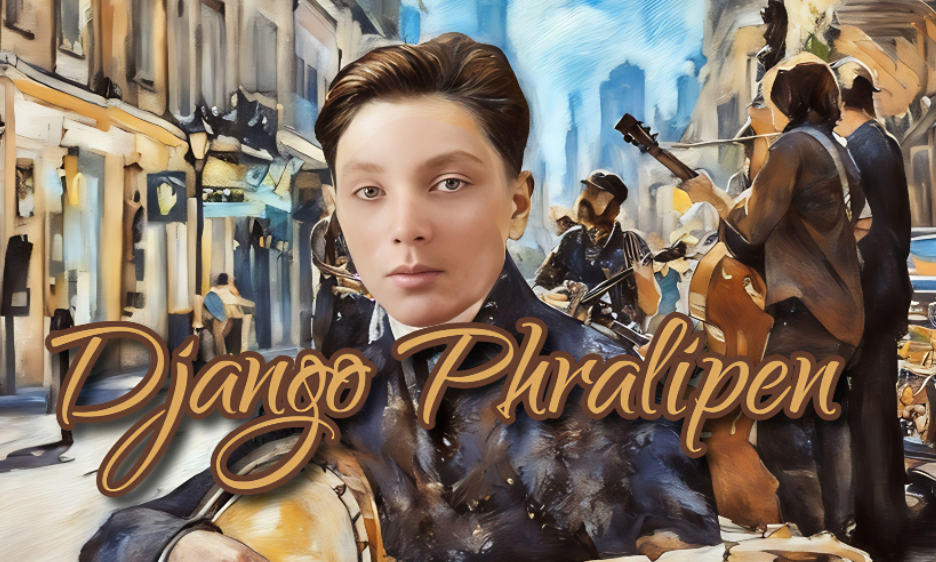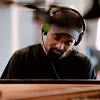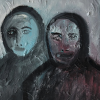Home » Jazz Articles » Django's Cosmic Echo » Afterword: Final Thoughts & Questions
Afterword: Final Thoughts & Questions

Courtesy AI
Chapters
1 | 2 | 3 | 4 | 5 | 6 | 7 | 8 | 9 | 10 | 11 | 12 | 13 | 14 | 15 | 16 | 17 | 18In 2019 the film Yesterday was released. A struggling singer/songwriter is hit by a bus and a "glitch" occurs—he suddenly discovers he is the only person who has ever heard of the Beatles... In a panic, he googles them... nothing. No spoiler, but the film is actually a testimony to the phenomenal songwriting prowess of the Beatles.
Clip from Yesterday
Django's Cosmic Echo imagines the genius of Django Reinhardt, unencumbered by injury, in the prime of his youth in the Summer of Love when guitars ruled. This story came to me in a flash, and writing it down was a riveting experience. Picture the story you just read transformed into a streaming series, with musical scenes brought to life on film—someone like Matteo Mancuso starring in a leading role. That's what I imagined as I wrote: basically a simple tale that might awaken the uninitiated to the genius of Django Reinhardt. That said, while I am a Django fan and admirer, I am by no means a serious student of his life or his music. If you happen to be, please feel free to share your insights into Django, in terms of the story, but also concerning the following questions.
The first question centers around a decision Django may never have seriously considered after his accident: what if he had chosen to play as a left-hander? Essentially the reverse of Mark Knopfler, Duane Allman, Gary Moore, Joe Perry, Steve Morse, and Robert Fripp—all left-handed guitarists who chose to play right-handed. Some of them claim this gave them an advantage—allowing them to use their dominant hand's superior dexterity on the fretboard, much like pianists employ their stronger hand for melody. Django was eighteen when the caravan fire left him with only a thumb and two intact fingers on his fretting hand. What if, instead of spending two years developing his revolutionary workaround technique, he had taken the opposite approach? What if he had spent that same time completely relearning the instrument using his intact dominant right hand on the fretboard while adapting his damaged left hand for picking? Even after three years of retraining, he would have emerged at twenty-one with decades of exploration ahead, potentially possessing even greater technical command than his already formidable abilities allowed.
I ran this by several AI models to get their take, all were intrigued, but tended to see his overcoming his injury as the core of his genius, and his workaround technique as the key. But a deep thinking model gave me this answer:
The advantages of switching could have been significant
His dominant right hand would have brought superior dexterity and coordination to fretting, potentially enabling even more complex chord voicings and single-note passages Those two remaining fingers plus thumb might have been adequate for picking, especially given Django's already remarkable musical intuition. As you note with the other guitarists, the dominant hand on the fretboard can offer enhanced "feel" and precision. But there are some intriguing considerations:Physical factors
Django's injured hand had permanent contractures—the damaged fingers were curled and essentially fused. This might have actually created a unique "pick" shape that could have been advantageous for his new picking technique.Musical implications
Django's eventual technique, using primarily his index and middle finger for fretting, created a very distinctive sound and phrasing. His limitations forced him into note choices and chord voicings that became part of his signature style. A "relearned" Django with full fretting dexterity might have developed into a completely different musical voice.Temperament
Django was famously impatient and spontaneous. The grueling process of completely relearning his instrument might not have suited his personality as well as adapting his existing knowledge. It's tantalizing to imagine what musical territories this alternate Django might have explored with enhanced technical capabilities!Timing and Technology: The Slide or Resonator Guitar
The second possibility involves timing and technology. In the late 1920s, just as Django was establishing himself in Paris's music scene, the Dopyera brothers perfected the Dobro's resonator design in Los Angeles. Simultaneously, Hawaiian steel guitar masters like Sol Hoʻopiʻi were touring European music halls, bringing jazz sophistication to slide technique. Interestingly, these influences were circulating through the very Parisian clubs where Django performed. Imagine Django discovering the resonator guitar and applying his musical genius to slide playing. Beyond the expressive possibilities, the resonator's increased volume would have been a practical advantage in the acoustic ensembles of early Gypsy jazz. His damaged hand might actually have been advantageous for slide work—requiring controlled bar movement rather than individual finger dexterity.The combination of Django's harmonic sophistication with the emotive sustain and metallic voice of slide guitar could have created an entirely new musical language—a hybrid of Gypsy passion and steel guitar expressiveness that jazz had never heard.
Both scenarios remind us that musical history often turns on the smallest chances—a conversation overheard, an instrument glimpsed in a shop window, a moment of curiosity leading in an unexpected direction. Django's actual path gave us treasures enough for several lifetimes, but these alternate routes are intriguing musical worlds that remain forever unexplored.
Tags
Django's Cosmic Echo
Alan Bryson
Mark Knopfler
Duane Allman
Gary Moore
Joe Perry
Steve Morse
Robert Fripp
Django Reinhardt
PREVIOUS / NEXT
Support All About Jazz
 All About Jazz has been a pillar of jazz since 1995, championing it as an art form and, more importantly, supporting the musicians who make it. Our enduring commitment has made "AAJ" one of the most culturally important websites of its kind, read by hundreds of thousands of fans, musicians and industry figures every month.
All About Jazz has been a pillar of jazz since 1995, championing it as an art form and, more importantly, supporting the musicians who make it. Our enduring commitment has made "AAJ" one of the most culturally important websites of its kind, read by hundreds of thousands of fans, musicians and industry figures every month.
























